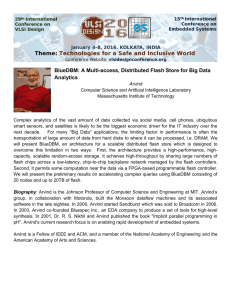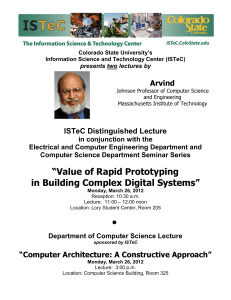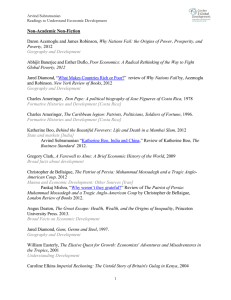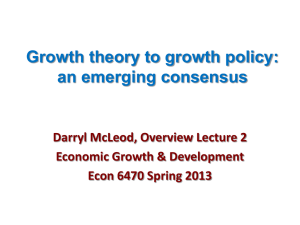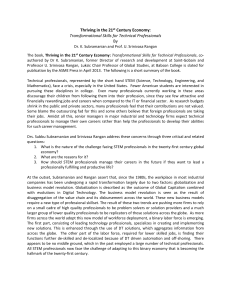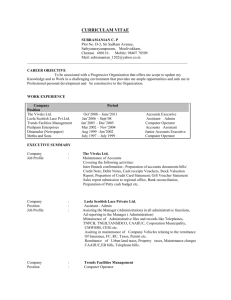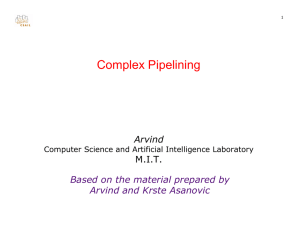odrik “ ” “
advertisement
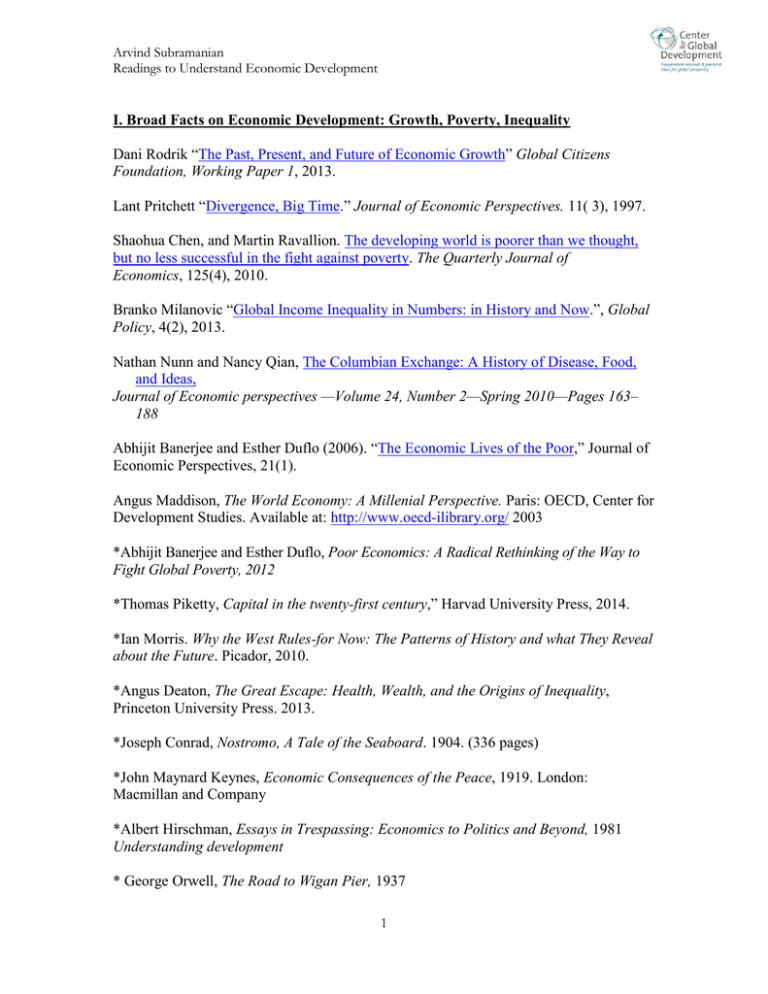
Arvind Subramanian Readings to Understand Economic Development I. Broad Facts on Economic Development: Growth, Poverty, Inequality Dani Rodrik “The Past, Present, and Future of Economic Growth” Global Citizens Foundation, Working Paper 1, 2013. Lant Pritchett “Divergence, Big Time.” Journal of Economic Perspectives. 11( 3), 1997. Shaohua Chen, and Martin Ravallion. The developing world is poorer than we thought, but no less successful in the fight against poverty. The Quarterly Journal of Economics, 125(4), 2010. Branko Milanovic “Global Income Inequality in Numbers: in History and Now.”, Global Policy, 4(2), 2013. Nathan Nunn and Nancy Qian, The Columbian Exchange: A History of Disease, Food, and Ideas, Journal of Economic perspectives —Volume 24, Number 2—Spring 2010—Pages 163– 188 Abhijit Banerjee and Esther Duflo (2006). “The Economic Lives of the Poor,” Journal of Economic Perspectives, 21(1). Angus Maddison, The World Economy: A Millenial Perspective. Paris: OECD, Center for Development Studies. Available at: http://www.oecd-ilibrary.org/ 2003 *Abhijit Banerjee and Esther Duflo, Poor Economics: A Radical Rethinking of the Way to Fight Global Poverty, 2012 *Thomas Piketty, Capital in the twenty-first century,” Harvad University Press, 2014. *Ian Morris. Why the West Rules-for Now: The Patterns of History and what They Reveal about the Future. Picador, 2010. *Angus Deaton, The Great Escape: Health, Wealth, and the Origins of Inequality, Princeton University Press. 2013. *Joseph Conrad, Nostromo, A Tale of the Seaboard. 1904. (336 pages) *John Maynard Keynes, Economic Consequences of the Peace, 1919. London: Macmillan and Company *Albert Hirschman, Essays in Trespassing: Economics to Politics and Beyond, 1981 Understanding development * George Orwell, The Road to Wigan Pier, 1937 1 Arvind Subramanian Readings to Understand Economic Development Understanding development II. Geography and Development Jeffrey Sachs, “Institutions Matter, but Not for Everything The role of geography and resource endowments in development shouldn’t be underestimated.” Finance & Development, 2003 *Jared Diamond, Guns, Germs and Steel, 1997. *Jared Diamond, “What Makes Countries Rich or Poor?” review of Why Nations Fail by, Acemoglu and Robinson. New York Review of Books, 2012 *Ian Morris. Why the West Rules-for Now: The Patterns of History and what They Reveal about the Future. Picador, 2010. *Giusepe de Lampedusa, The Leopard, transl. by Archibald Colquhoun, New York: Pantheon Books, 1958 (322 pages) III. Institutions/History and Development Daron Acemoglu, Simon Johnson and James Robinson , “The Colonial Origins of Development: An Empirical Investigation”, American Economic Review, 91(5), 2001 Daron Acemoglu, “Root Causes. A historical approach to assessing the role of institutions in economic development,” Finance and Development, 2003 *Daron Acemoglu and James Robinson, Why Nations Fail: the Origins of Power, Prosperity, and Poverty, 2012 Arvind Subramanian, Which Nations Failed, American Prospect, October 30,2012 Abhijit Banerjee and Lakshmi Iyer, “History, Institutions, and Economic Performance: The Legacy of Colonial Land Tenure Systems in India.” The American Economic Review, 95(4), 2005. Melissa Dell, Path Dependence in Development: Evidence from the Mexican Revolution, 2012 Stanley Engerman and Kenneth Sokoloff , “History Lessons, Institutions, Factor Endowments, and Paths of Development in the New World,” Journal of Economic Perspectives, 14(3) 2000. Nathan Nunn,"The Long-Term Effects of Africa’s Slave Trade” Quarterly Journal of Economics, 2008. 2 Arvind Subramanian Readings to Understand Economic Development *Frank Fukuyama, The Origins of Political Order: From Prehuman Times to the French Revolution, 2012 Institutions and Development *David Mitchell, The Thousand Autumns of Jacob de Zoet, 2010 Japan - the colonization that wasn’t IV. Formative Histories and Development *Charles Ameringer, Don Pepe: A political biography of Jose Figueres of Costa Rica, 1978 Costa Rica *Charles Ameringer, The Caribbean legion: Patriots, Politicians, Soldiers of Fortune, 1996. Costa Rica *Alejandro Carpentier, The Kingdom of this World, 1949. Transl. in 1957 by Alfred A. Knopf. Haiti *Caroline Elkins Imperial Reckoning: The Untold Story of Britain's Gulag in Kenya, 2004 *Jon Lee Anderson, “Death of the Tiger,” The New Yorker, January 17, 2011. Sri Lanka *James Manor, The Expedient Utopian: Bandaranaike and Ceylon, 1989 Sri Lanka Ryszard Kapuściński, The Emperor: Downfall of an Autocrat, 1983 [Formative histories and development Ethiopia] Ryszard Kapuściński, The Shadow of the Sun, 2001 [Africa] *Thant Myint-U, The River of Lost Footsteps: A Personal History of Burma, 2006 Burma *V.S. Naipaul, Don’t Cry for Me, Argentina Argentina *V.S. Naipaul, The Middle Passage, 1962 Guyana *Doug Rodgers A Last Resort: A Memoir of Zimbabwe, 2009. 3 Arvind Subramanian Readings to Understand Economic Development Zimbabwe Ari Shavit, My Promised Land: The Triumph and Tragedy of Israel, 2013 Israel James Manor, The Expedient Utopian: Bandaranaike and Ceylon, 1989 Formative Histories and Development [Sri Lanka] V. Manna and Economic Development: Foreign Aid Rajan Raghuram, G., and Arvind Subramanian, “Aid and Growth: What Does the CrossCountry Evidence Really Show?” Review of Economics and Statistics, 2008. Nancy Birdsall, “Seven Deadly Sins: Reflections on Donor Failings,” CGD Working Paper, 2005. Ilyana Kuziemko and Eric Werker. “How much is a seat on the Security Council worth? Foreign aid and bribery at the United Nations.” Journal of Political Economy, 114(5), 2006. Nathan Nunn and Nancy Qian , 2013, US Food Aid and Civil Conflict, American Economic Review (forthcoming) *Philip Gourevitch, “Alms Dealers: Can you provide humanitarian aid without facilitating conflicts?” The New Yorker, 2010. *Paul Theroux , Dark Star Safari: Overland from Cairo to Cape Town, 2003 VI. Manna and Economic Development: Natural Resources Michael Ross. The Oil Curse: How Petroleum Wealth Shapes the Development of Nations, 2011 Jeremy Frankel. “The Natural Resource Curse: A Survey” NBER Working Paper 15836, 2010 *Robert Klitgaard, Tropical Gangsters: One Man's Experience With Development And Decadence In Deepest Africa,1991. Equatorial Guinea *Jon Lee Anderson, “Our New Best Friend,” The New Yorker, October 7, 2002. Sao Tome and Principe *Karl Meier, This House has Fallen: Midnight in Nigeria, 2000. Nigeria 4 Arvind Subramanian Readings to Understand Economic Development *Patrick Radden Keefe “Buried Secrets: How an Israeli billionaire wrested control of one of Africa’s biggest prizes” July, 8 2013. Guinea *Daniel Yergin, The Prize: The Epic Quest for Oil, Money & Power, 1991 *Christopher de Bellaigue, The Patriot of Persia: Muhammad Mossadegh and a Tragic Anglo-American Coup, 2012 Iran VII. Manna and Economic Development: Other Sources *Dan Koeppel, Banana: The Fate of the Fruit That Changed the World Banana *Joseph Conrad, Heart of Darkness, 1899 Rubber *Christopher de Bellaigue, The Patriot of Persia: Muhammad Mossadegh and a Tragic Anglo-American Coup, 2012 Iran *Pankaj Mishra, “Why weren’t they grateful?” Review of The Patriot of Persia: Muhammad Mossadegh and a Tragic Anglo-American Coup by Christopher de Bellaigue, London Review of Books 2012. *Walter Isaacson and Evan Thomas, The Wise Men: Six Friends and the World They Made, 1986 *Adam Hochschild, King Leopold's Ghost: A Story of Greed, Terror and Heroism in Colonial Africa, 1998 *Stephen Kizner, The Brothers: John Foster Dulles, Allen Dulles, and Their Secret World War, 2013. Military Aid *Mario Vargos Llosa, Feast of the Goat, 2000 Manna and Economic Development [Dominican Republic) *Gabriel Garcia Marquez, Autumn of the Patriarch, 1976 Caribbean *Gabriel Garcia Marquez, One Hundred Years of Solitude, 1970 Colombia/banana 5 Arvind Subramanian Readings to Understand Economic Development *David Mcullough , The Path Between the Seas: The Creation of the Panama Canal, 1870-1914, 1977 Panama *Pankaj Mishra, “Watch this Man” Review Civilisation: The West and the Rest, by Niall Ferguson. London Review of Books 2011. *Samantha Weinberg, The Last of the Pirates: The Search for Bob Denard, 1995 Comoros *Michela Wrong, I Didn't Do It for You: How the World Betrayed a Small African Nation, 2006 Eritrea *Michela Wrong, It’s Our Turn to Eat: The Story of a Kenyan Whistle Blower, 2010 Kenya VIII. Non-Manna and Economic Development: Taxation Daniel Berger, “Taxes, Institutions and Local Governance: Evidence from a Natural Experiment in Colonial Nigeria”, 2009 Timothy Besley, and Torsten Persson, “Taxation and Development”, Chapter 2 of Handbook of Public Economics, Vol. 5, Ed. by Alan J. Auerbach, Raj Chetty, Martin Feldstein and Emmanuel Saez, 2013. Nicholas Eubank. “Taxation, Political Accountability and Foreign Aid: Lessons from Somaliland”. Journal of Development Studies, 48(4), 2012. Somaliland John Joseph Wallis “American Government Finance in the Long Run: 1790 to 1990” The Journal of Economic Perspectives, 14(1), 2000. *David Foster Wallace, The Pale King, 2011. *Lawrence Zelenak “When We Loved Form 1040” New York Times Op-ed. 2013 IX. Social cleavage and economic development Alberto Alesina, Arnaud Devleeschauwer, William Easterly, Sergio Kurlat, and Romain Wacziarg, “Fractionalization”, National Bureau of Economic Research, Working Paper 9411, 2003 6 Arvind Subramanian Readings to Understand Economic Development William Easterly and Ross Levine, “Africa's growth tragedy: policies and ethnic divisions.” The Quarterly Journal of Economics, 112(4). 1997 Edward Miguel, “Tribe or Nation?: Nation Building and Public Goods in Kenya versus Tanzania.” World Politics 56(3), 2004. *Edwidge Danticat, The Farming of Bones, 2003 Haiti *C.L.R. James, The Black Jacobins, 1963 Haiti *Shehan Karunatilaka, Chinaman, 2011 Sri Lanka *Michael Ondaatje , Anil’s Ghost, 2000 Sri Lanka X. Conflict and Economic Development Christopher Blattman and Edward Miguel. "Civil war." Journal of Economic Literature: 2010 Oiendrila Dube and Juan F. Vargas, “Commodity Price Shocks and Civil Conflict: Evidence from Colombia,” 2013 Edward Miguel, Satyanath Shankar, and Ernest Sergenti, “Economic shocks and civil conflict: An instrumental variables approach.” Journal of Political Economy 112(4), 2004 *Economist, How to Stop Fighting, Sometimes November 9, 2013 XI. Crossing the Hobbesian Threshold: Mauritius and Botswana Deborah Brautigam, “Coalitions, Capitalists and Credibility: Overcoming the crisis of confidence at independence in Mauritius”, 2009 Jeremy Frankel, “Mauritius: African Success Story” NBER Working Paper 16569, 2010 Arvind Subramanian, “The Mauritian Success Story And Its Lessons,” Working paper / UNU-WIDER, No. 2009.36, 2009 Acemoglu, Johnson and Robinson. “An African Success Story: Botswana”, in Rodrik, D. (Ed.). In search of prosperity: Analytic narratives on economic growth. 2003 7 Arvind Subramanian Readings to Understand Economic Development Laura Alfaro, Debora Spar, and Faheen Allibhoy, Botswana: A Diamond in the Rough, HBS discussion paper. *Amitava Ghosh, The Sea of Poppies, 2008 *Jean-Marie Gustave Le Clezio, The Prospector, 1969, reed. 2008 *V.S. Naipaul, Overcrowded Barracoon, 1984 *Mark Twain, Following the Equator: A Journey Around the World, 1897 *Susan Willams Color Bar: The triumph of Seretse Khama and His Nation, 2007 *Thomas Tlou, Neil Parsons & Willie Henderson, Seretse Khama, 1921-80 XII. India: The Precocious Development Model Kalpana Kochhar et. al., “India’s Pattern of Development: What Happened, What Follows” Frank Fukuyama, The Origins of Political Order: From Prehuman Times to the French Revolution, 2012 *Sunil Khilnani, The Idea of India *Aravind Adiga, The White Tiger, 2008 *Ramachandra Guha, India After Gandhi (Part 1), 2011 *Pratap Mehta, The Burden of Democracy, 2003 *Katherine Boo, Behind the Beautiful Forevers: Life and Death in a Mumbai Slum, 2012 *Arvind Subramanian “Katherine Boo, India and China,” Review of Katherine Boo, The Business Standard 2012. XIII. China: Defying Development Verities Yingyi Qian, “How Reform Worked in China”, 2001 Dani Rodrik, “Growth Strategies”, 2004 Dani Rodrik, “Understanding Economic Policy Reform,” Journal of Economic Literature, vol, XXXIV, 1996 8 Arvind Subramanian Readings to Understand Economic Development Frank Fukuyama, The Origins of Political Order: From Prehuman Times to the French Revolution, 2012 *Peter Hessler, River Town: Two Years on the Yangtze, 2001 *Peter Hessler, Oracle Bones: A Journey Through Time in China, 2009 *Rana Mitter, The Forgotten Ally: China’s World War II, 1937-194 , 2013 *Orville Schell and Robert De Lury: Wealth and Power: China's Long March to the Twenty-first Century¸2013 *Ezra F. Vogel, Deng Xiaoping and the Transformation of China,2011 XIV. Helping the poor: Lessons for Outsiders Nancy Birdsall, Dani Rodrik, and Arvind Subramanian, “How to Help Poor Countries: Getting Development Right” Foreign Affairs, 2005 Michael A. Clemens, “Economics and Migration: Trillion-Dollar Bills on the Sidewalk?” Journal of Economic Perspectives 25(3), 2011 9
